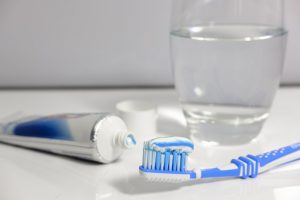
Tooth decay, also known as cavities or caries, can be a major source of pain. The process of tooth decay that leads to cavities will occur in various stages, and can eventually lead to tooth loss if left untreated. Here at Westlake Family Dentistry, we pride ourselves in helping our patients become educated on proper dental care and preventative medicine and we want to help educate you on how you can better protect yourself from the dangers of tooth decay.
How Does Tooth Decay Begin?
The first stage of tooth decay involves the introduction of sugary foods to bacteria that live in the mouth. The sugar will help the bacteria to thrive and produce acids that will adhere to the many surfaces in your mouth, creating plaque and eating away at the enamel on your teeth. When an opening is made in the enamel, a cavity begins to form.
Cavities do not form overnight and can be prevented in most cases. In fact, it can take months or even years for them to occur. A person’s mouth will normally rest at pH 7, and the environment needs to dip below that number to become acidic, allowing plaque to affect the teeth. This will usually only happen in spurts and is the reason why cavities take so long to develop. This lengthy process gives most patients a window of time to reverse the effects of sugar and bacteria in the mouth. That being said, some people are more prone to developing cavities than others, and those individuals should take special precautions when it comes to the prevention of tooth decay.
How Can I Prevent Tooth Decay?
- Evaluate your diet.The first important step is to eat a well-balanced diet that is low in added sugar and to avoid sugary drinks. Try to avoid snacking and sipping, as frequent intake causes your teeth to constantly be under attack from the bacteria-sugar reaction that causes cavities.
- Brush your teeth or rinse your mouth after eating. Brushing will interrupt the development of cavities, especially after consuming foods such as crackers, bread, juice, and milk. Tooth decay will pick up where it left off when conditions become acidic again, so you can also rinse your mouth out with water after a meal if you are unable to brush. Brush your teeth at least twice a day with a fluoride toothpaste.
- Floss. Be sure to make this a part of your dental hygiene routine, as this will remove food particles that become trapped between your teeth.
- Incorporate fluoride into your dental routine. This substance reduces bacteria’s ability to produce acid, and it will prevent the loss of minerals in teeth. Most brands of toothpaste contain fluoride, and you can also drink water that has fluoride added to it.
- Maintain routine professional cleanings and examinations with your dentist. Early detection is key in treating tooth decay, and maintaining regular professional cleanings can help prevent cavities from forming amongst other benefits. Ask your dentist about additional fluoride supplements that can be offered to you in the office as a part of your next visit. If you are prone to cavities, it may be recommended that you have dental sealants to help guard the surface of your teeth against the dangers of cavity-causing bacteria.
- Ask your dentist about antibacterial treatments. Another great defense against tooth decay is incorporating antibacterial treatments into your care plan, which can be as simple as adding an antiseptic mouth rinse into your dental routine. This is especially important if you are prone to cavities. Talk with your dentist about which treatment is best for your individual needs.
We welcome you to visit our office to discuss any further questions you may have about how to better protect yourself from the dangers of tooth decay. We also encourage you to schedule regular cleanings at Westlake Family Dentistry to ensure good dental health. Contact Westlake Family Dental Care today to schedule your appointment!
